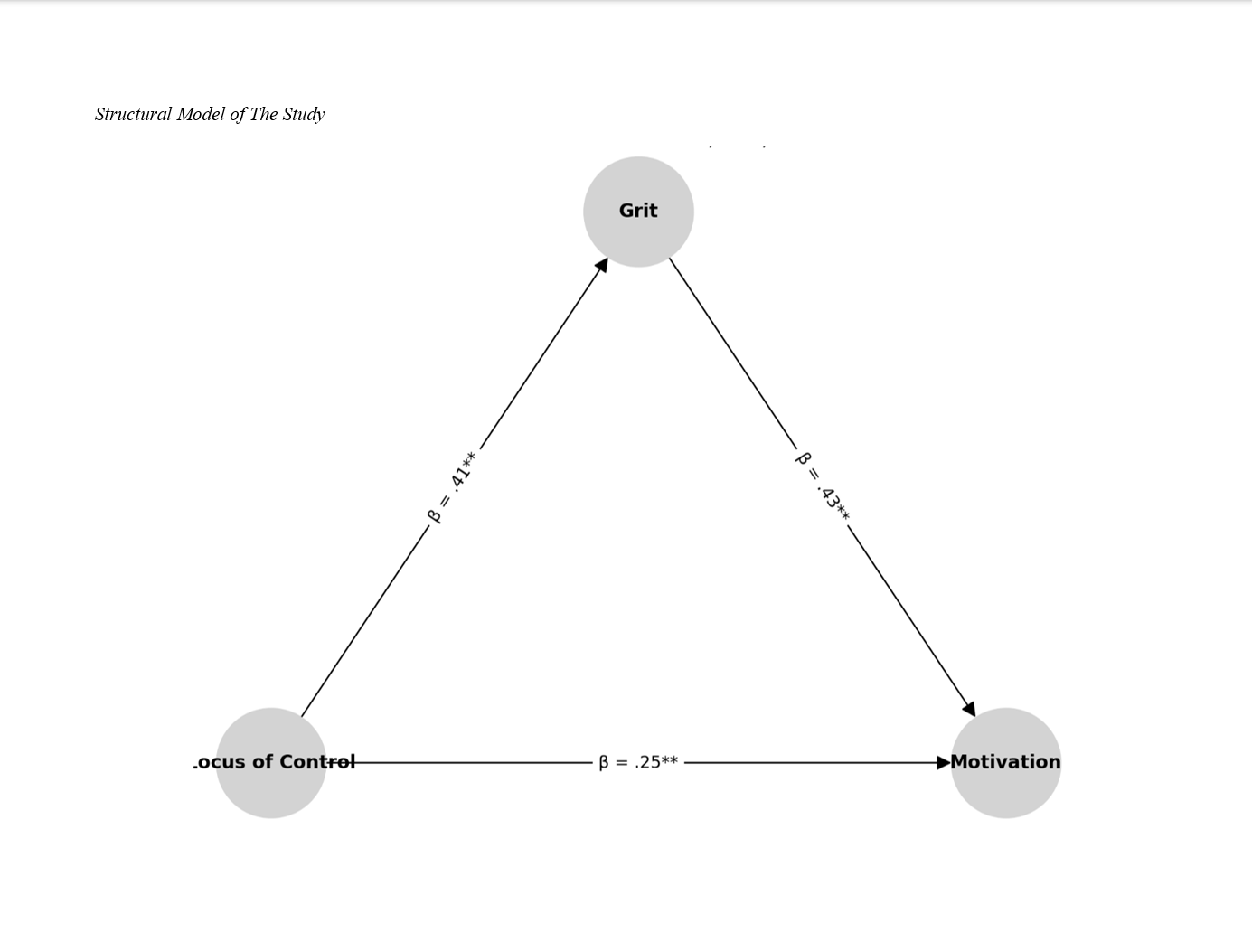Locus of Control and Its Relationship with Motivation: Mediated by Grit
Keywords:
Locus of Control, Grit, Motivation, Adolescents, Structural Equation Modeling, Educational PsychologyAbstract
Objective: This study aimed to investigate the relationship between locus of control and academic motivation among adolescents, with grit examined as a potential mediating variable.
Methods and Materials: The study employed a descriptive correlational design and was conducted among 380 high school students in Canada, selected based on the Morgan and Krejcie sample size table. Participants completed three standardized instruments: the Rotter Internal-External Locus of Control Scale, the Short Grit Scale (Grit-S), and the Academic Motivation Scale (AMS). Data were analyzed using SPSS-27 to compute descriptive statistics and Pearson correlation coefficients, while Structural Equation Modeling (SEM) was performed using AMOS-21 to evaluate the mediating effect of grit and assess the fit of the proposed model.
Findings: Descriptive analysis showed that the mean scores were 12.86 (SD = 3.47) for locus of control, 3.62 (SD = 0.58) for grit, and 5.14 (SD = 0.76) for academic motivation. Pearson correlations revealed significant positive relationships between all variables: locus of control and grit (r = .41, p < .001), grit and motivation (r = .47, p < .001), and locus of control and motivation (r = .36, p < .001). SEM results indicated a good model fit (χ²/df = 1.90, CFI = 0.97, RMSEA = 0.048). Grit significantly mediated the relationship between locus of control and motivation, with both direct (β = .25, p = .002) and indirect effects (β = .18, p < .001) being statistically significant.
Conclusion: The findings suggest that adolescents with an internal locus of control tend to demonstrate higher grit, which in turn enhances their academic motivation. Grit functions as a key psychological mechanism that strengthens the influence of control beliefs on motivational outcomes, indicating its importance in educational development and intervention planning.
Downloads
References
Ganpantsurova, O. B., Vastaeva, L. S., & Zhdanova, A. D. (2022). Peculiarities of Locus of Control and Motivation of Achievement in Senior Schoolchildren and in Students of Professional College. Smalta(1), 35-44. https://doi.org/10.15293/2312-1580.2201.03
Haidari, S. M., KoÇOĞLu, A., & Kanadlı, S. (2023). Contribution of Locus of Control, Self-Efficacy, and Motivation to Student Achievement: A Meta-Analytic Structural Equation Modelling. Journal on Efficiency and Responsibility in Education and Science, 16(3), 245-261. https://doi.org/10.7160/eriesj.2023.160308
Hajmohammadi, E., & Aghayani, B. (2022). A Study on Motivation and Locus of Control Among Male and Female EFL Learners. Mj, 46(2), 1-13. https://doi.org/10.61871/mj.v46n2-13
Hastuti, W., & Farid, M. (2016). Motivasi Kerja, Internal Locus of Control Dan Kepuasan Kerja Pada Karyawan Bagian Marketing Dan Supporting Di PT X Cabang Surabaya. Persona Jurnal Psikologi Indonesia, 4(02). https://doi.org/10.30996/persona.v4i02.561
Illays, S., Nazar, N., Hafeez, S., Arshad, S., & Adeeb, M. (2024). Locus of Control as Moderator Between Work Motivation and Job Satisfaction Among Bank Employees. JHRR, 4(1), 412-418. https://doi.org/10.61919/jhrr.v4i1.396
Irawati, R. (2023). Altruisme Dan Self Esteem Pengaruhnya Terhadap Motivasi Menjadi Relawan Melalui Locus of Control. Jurnal Manajemen Dan Profesional, 4(2), 240-254. https://doi.org/10.32815/jpro.v4i2.1858
Karnati, N., & Sibawaihin, I. (2017). Pengaruh Locus of Control Dan Motivasi Instrinsik Terhadap Kepuasan Kerja Guru. Jurnal Sosial Humaniora, 8(1), 29. https://doi.org/10.30997/jsh.v8i1.581
Kropovnitsky, O. V. (2018). Correlation of Cope-Strategies, Locus of Control and Motivation of Achievement at Managers. Вестник Пермского Университета Философия Психология Социология(4), 541-549. https://doi.org/10.17072/2078-7898/2018-4-541-549
Kusnanto, K., Susanti, R. D., Nimah, L., & Zulkarnain, H. (2019). The Correlation Between Motivation and Health Locus of Control With Adherence Dietary of Diabetes Mellitus. Jurnal Ners, 13(2), 171-177. https://doi.org/10.20473/jn.v13i2.9700
Li, X., Mao, Z. H., Zhao, J., Wang, Y., & Wang, Y. (2024). Relationships Among Locus of Control, Academic Engagement, and Achievement Motivation in Chinese Adolescents. Social Behavior and Personality an International Journal, 52(5), 12640E-12655E. https://doi.org/10.2224/sbp.12640
Mızrak, Ş., & Aliyev, R. (2024). The Mediating Role of Self-Regulation in the Relationship Between Parental Attitude and Locus of Control With Academic Motivation. Bedu, 5(2), 40-56. https://doi.org/10.29329/bedu.2024.1064.3
Novitasari, R., Nasution, U. C. M., & Pratiwi, N. M. I. (2023). Pengaruh Pengetahuan Investasi, Motivasi Investasi, Locus of Control, Dan Risk Tolerance Terhadap Keputusan Investasi Mahasiswa Administrasi Bisnis Universitas 17 Agustus 1945 Surabaya. Jdab, 9(1), 1-8. https://doi.org/10.30996/jdab.v9i1.9644
Oshakuade, O. J., Ekpenyon, S. I., & Otutu, T. I. (2023). Locus of Control, Achievement Motivation and Academic Self Efficacy as Determinants of Secondary School Students’ Academic Performance in Ondo State, Nigeria. International Journal of Education Learning and Development, 11(6), 44-51. https://doi.org/10.37745/ijeld.2013/vol11n64451
Połom, M. (2018). Struktura Motywacji Osiągnięć a Poczucie Umiejscowienia Kontroli U Uczennic Szkół Ponadgimnazjalnych. Kwartalnik Pedagogiczny, 63(1 (247)), 163-178. https://doi.org/10.5604/01.3001.0011.8241
Premkumar, K., Sivagurunathan, C., Ezhilvanan, M., & Vikram, A. (2023). Assessment of Level of Motivation, Locus of Control and Their Associated Factors Among Alcohol Dependent Males: A Longitudinal Study. JOURNAL of CLINICAL and DIAGNOSTIC RESEARCH. https://doi.org/10.7860/jcdr/2023/60930.17286
Rahmawati, D., & Suciati, S. (2023). Pengaruh Achievement Motivation, Locus of Control, Dan Study Habits Terhadap Hasil Belajar Matematika Siswa Sekolah Dasar. Jurnal Studi Guru Dan Pembelajaran, 6(3), 273-292. https://doi.org/10.30605/jsgp.6.3.2023.3080
Saleh, A., Khumas, A., & Jalal, N. M. (2023). The the Effect of Locus of Control on Academic Grit in Final Year Students. Lectura Jurnal Pendidikan, 14(2), 352-362. https://doi.org/10.31849/lectura.v14i2.15064
Shmidzen, I. Y., & Yukhymenko, I. V. (2021). Theoretical Aspects of Deciding the Motive for Controlling the Locus of Control. Scientific Bulletin of Uzhhorod National University. Series: Ps(1), 36-39. https://doi.org/10.32782/psy-visnyk/2021.1.8
Sujadi, E. (2018). Pengaruh Konsep Diri Dan Locus of Control Terhadap Motivasi Berprestasi. Educational Guidance and Counseling Development Journal, 1(1), 32. https://doi.org/10.24014/egcdj.v1i1.4808
Vostokova, J. I., & Дворникова, И. Н. (2024). Features of Educational and Professional Motivation of Students — Future Teachers With Different Locus of Control. Bulletin of Psychological Practice in Education, 21(3), 14-21. https://doi.org/10.17759/bppe.2024210302
Zulfa, M. Y., Daharnis, D., & Syahniar, S. (2017). Hubungan Antara Locus of Control Dan Persepsi Siswa Tentang Pendidikan Dengan Motivasi Belajar Serta Implikasinya Dalam Pelayanan Bimbingan Dan Konseling. Jppi (Jurnal Penelitian Pendidikan Indonesia), 3(1), 1-11. https://doi.org/10.29210/02017103

Downloads
Additional Files
Published
Submitted
Revised
Accepted
Issue
Section
License

This work is licensed under a Creative Commons Attribution-NonCommercial 4.0 International License.








